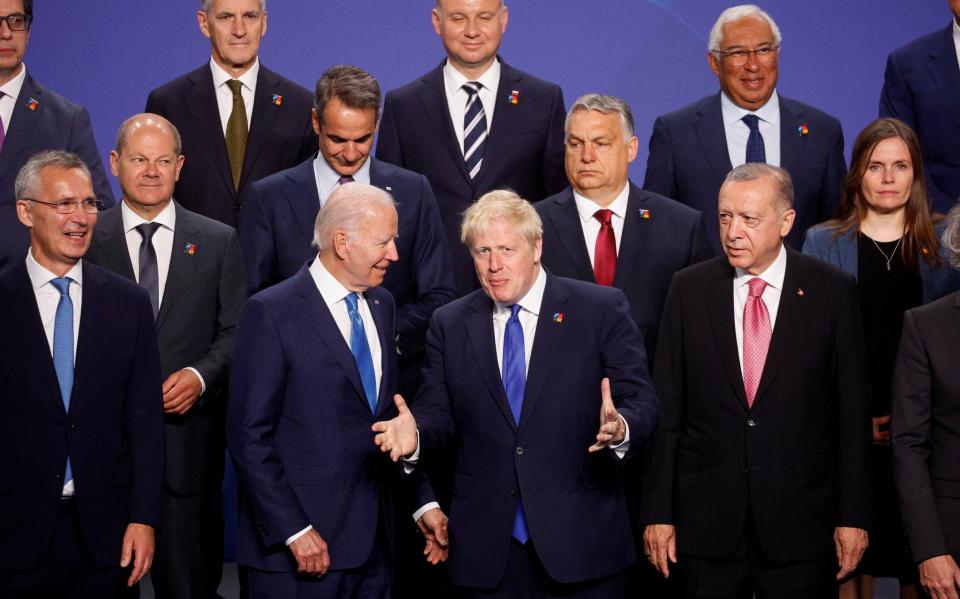Boris Johnson at odds with British Army chief as he defends cuts to troop numbers

Boris Johnson has insisted the UK’s armed forces are the “right size” after calls from the head of the Army to reverse planned troop cuts in the wake of Russia’s invasion of Ukraine.
The Prime Minister’s official spokesman said on Tuesday it is “wrong to focus solely on the numbers” after General Sir Patrick Sanders said it would be “perverse” to press ahead with a planned cut of almost 10,000 personnel.
The row comes as Ben Wallace, the Defence Secretary, announced Britain would commit an extra 2,000 troops to defend Estonia under Nato plans to defend Eastern Europe against a Russian attack.
An existing battlegroup of around 900 soldiers will be permanently increased to Brigade strength - although not all units are expected to be based in the Baltics at the same time.
The 2,000 troops include the continuation of a temporary deployment sent to Estonia after the Ukrainian invasion, plus another 1,000 new troops at Nato’s disposal. In total, 3,000 will be committed to Nato defence.
The UK is also likely to make one of its two aircraft carriers available to the alliance.
This week’s Nato conference in Madrid has prompted a fresh row in Whitehall over defence spending, with Mr Wallace calling for more money for the military and warning: “The world is less secure than it was two [or] three years ago.”
But Downing Street has knocked back calls for a new review of the armed forces, pointing to figures that show the UK is spending 2.3 per cent of its GDP on defence when support for Ukraine is included.
Mr Johnson on Wednesday announced an additional £1bn of military funding for Ukraine, drawn from savings that other Cabinet ministers have been asked to find from departmental budgets.
He said Britain would “continue to stand squarely behind the Ukrainian people to ensure Putin fails in Ukraine.”
But Mr Wallace warned that including support for Ukraine in the defence budget was a “caveat” that would not directly protect the UK from Russian aggression.
“It isn't core defence spending. It is not my core budget, it doesn't buy me any more planes, tanks or ships,” he said.
New data from the House of Commons Library, released by the Liberal Democrats, shows the MoD’s day-to-day budget will decline in real terms for the next three years due to rising inflation - a fall of £1.7 billion.

Other Nato allies, including the Netherlands, have announced they plan to increase defence spending to meet the alliance’s budget target of 2 per cent of GDP.
Joe Biden said the United States will establish a permanent headquarters in Poland and send two additional F-35 fighter jet squadrons to the UK.
Jens Stoltenberg, Nato’s secretary-general, hailed a “historic and transformative summit” and welcomed Finland and Sweden moving a step closer to joining the alliance after signing a deal with Turkey on Tuesday.
Although the UK has the highest defence budget in Europe, Mr Johnson faces backlash at home for his refusal to cancel a planned axing of 9,500 troops by 2025.
Gen Sir Patrick, the Chief of the Defence staff, said before the summit it was “perverse” to continue with the cut in light of the war in Ukraine, arguing that it is not possible to “cyber your way across a river” and that “if this battle came, we would likely be outnumbered at the point of attack and fighting like hell”.
A source close to the General said on Tuesday night he was frustrated at Downing Street’s decision to double down on the cuts.
Mr Johnson’s official spokesman said: “The Prime Minister is of the view that we need to have the right size of force for the UK to both defend itself and to continue to play its leading role in the world. That is what we will do.”
He added: “We are still of the view that the approach we've set out with this massive increase in defence funding is the right one.
“Because it would be wrong, given what we are seeing play out in front of our eyes, to focus solely on numbers when we can see the impact that the latest technologies, equipment, training, intelligence, are having.”
The decision faces further backlash from Tory MPs, including the chairmen of two select committees.
Tom Tugendhat, who chairs the Foreign Affairs Committee, told The Telegraph: “Our army is smaller than any time since before the battle of Waterloo and Napoleon’s march on Russia. Our enemies see it and it is one reason they think they can test us.”
Tobias Ellwood, the Defence Committee chair, added: “Our defence budget is declining in real terms. Our world is getting more dangerous, not less.
“Yet No 10 still attempts to justify swathing cuts to our conversational forces, including a 10,000 reduction in troops.”

 Yahoo Movies
Yahoo Movies 